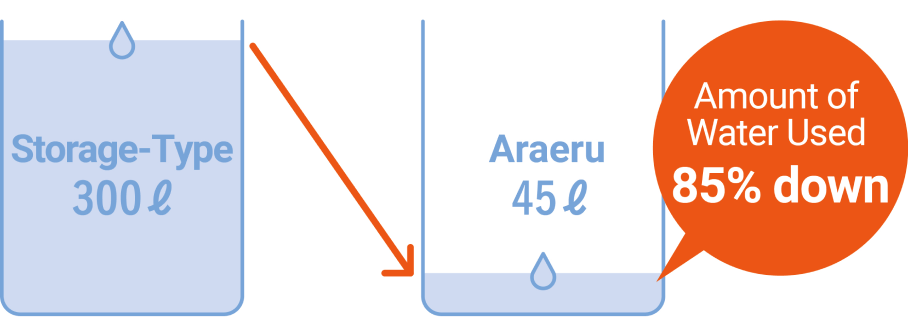Environmental Initiatives
Securing the Future of the Global Environment
Addressing environmental issues such as climate change is a critical management challenge for SHIP HEALTHCARE Group. Alongside efforts to reduce the environmental impact of its business activities, the Group promotes environmentally conscious services, aiming to achieve a sustainable society in harmony with the Earth’s future.
Waste Reduction through Proper Material Management
Under the mission “Creating environments for medical professionals,” SHIP HEALTHCARE Group provides SPD system, which manages medical materials in medical institutions, in Medical Supply Business in order to realize sustainable system for providing medicine. Through the SPD system (Supply, Processing, and Distribution), SHIP HEALTHCARE Group facilitates optimal inventory management and supply for medical institutions, helping to reduce medical waste and streamline logistics. Using IT-driven management, the system mitigates the risk of expired medical materials due to overstock, a challenge that burdens hospital operations and the environment.
Contribution to Reducing Medical Waste Through IT-Driven Management and Supply of Medical Materials
Medical institutions utilize a vast array of medical materials, each with different frequencies of use and expiration dates, requiring stringent management. These institutions often maintain excess inventory to ensure the provision of optimal medical care. However, this surplus can lead to the disposal of expired materials, posing both financial challenges to hospital management and environmental burdens.
The SHIP HEALTHCARE Group's SPD system leverages IT to enable efficient inventory management and supply, thereby mitigating waste. Moreover, we were the first in the industry to implement an SPD system utilizing RFID technology. By tagging medical materials with RFID, we can link data such as “when, where, by whom, for whom, and for what treatment” the materials were used. This enhances traceability and optimizes supply chain management (SCM)*, facilitating the timely, accurate, and efficient delivery of medical materials while supporting environmentally conscious healthcare practices.
*SCM: A management method aimed at optimizing the entire flow of materials and products, from procurement to delivery, by sharing order, inventory, sales, and logistics information across internal and external stakeholders.
Supporting Medical Professionals and Ensuring Stable Medical Services
For medical professionals, managing medical materials and performing various non-medical tasks can be burdensome. As the industry faces chronic staff shortages, implementing concrete measures to improve efficiency is crucial for delivering high-quality, sustainable healthcare.
The SHIP HEALTHCARE Group's SPD services provide high-value medical material management solutions powered by IT, alleviating the workload of healthcare professionals. This enables precise and rapid inventory management, fostering an environment where healthcare providers can focus on their core responsibilities. Additionally, our medical material storage facilities function as supply hubs during disasters, contributing to medical business continuity planning (BCP) and ensuring stable healthcare delivery.
KPI: SPD Contracts
246 facilities nationwide, encompassing approximately 92,400 beds, are under SPD management (as of March 2024).
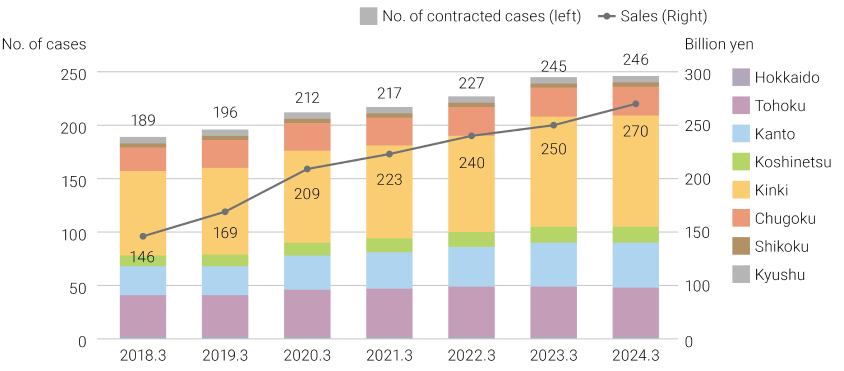
Total 246 facilities
YoY: +1 facility
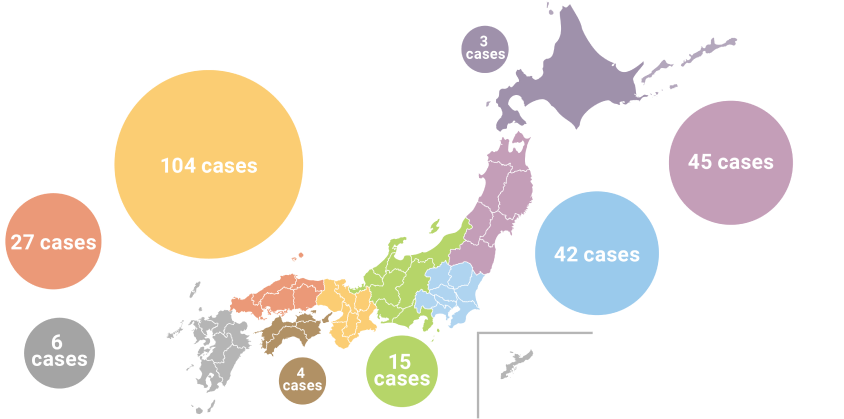
Promoting a Circular Model
As a comprehensive healthcare producer, SHIP HEALTHCARE Group utilizes significant resources across its diverse business domains. The Group aims to build a circular model by reducing greenhouse gas (GHG) emissions through energy conservation and waste reduction, reusing materials like packaging, and optimizing logistics processes.
Cardboard Recycling Initiative
The Medical Supply Business generates substantial cardboard waste during procurement and distribution. Approximately 6,000 used cardboard cases are discarded daily from major medical supply operations, requiring extensive energy resources for disposal.
In 2022, the Group launched an initiative to recycle discarded cardboard into paper bags for its sales teams. This practice promotes resource circulation while significantly reducing GHG emissions compared to conventional polypropylene-coated paper bags. The Group plans to expand this model across its operations, reinforcing its commitment to environmental sustainability.
KPI: Cardboard Recycling (Trial Phase)
40 kg of secondary materials recycled into 500 paper bags
75 % recovery rate
Future target:
11,000 kg/month processed, 8,000 kg recycled (72% recovery rate).
*Starting initiatives with Konishi Medical Instruments Co., Ltd., considering future expansion.
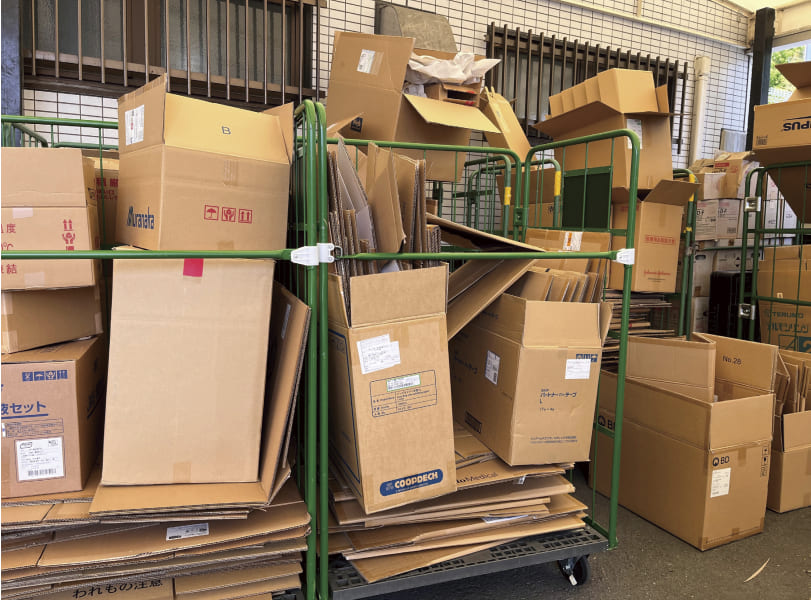
Waste from the Medical Supply Business
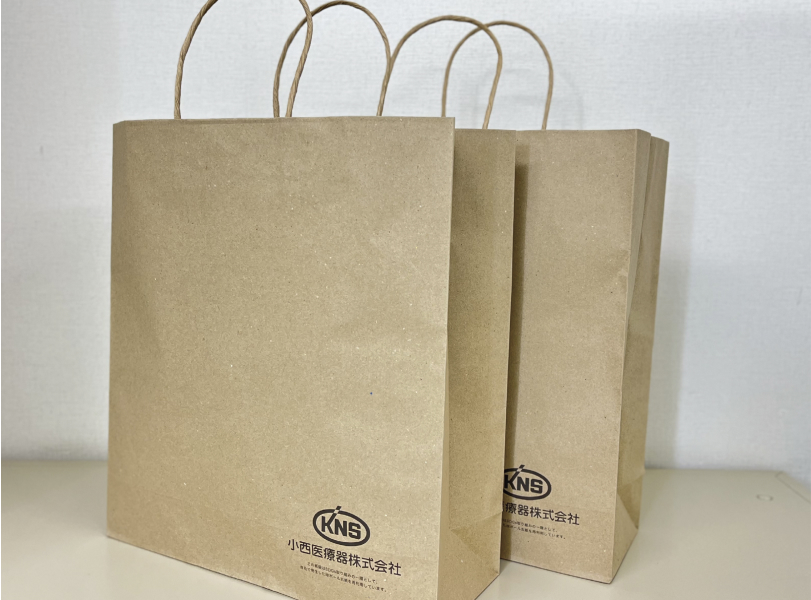
Paper bags made from recycled cardboard
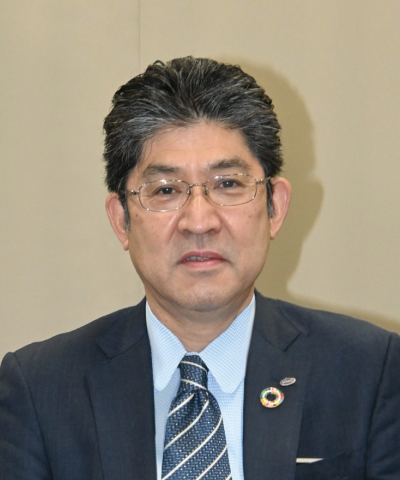
SHIMADA Masashi,
Deputy Division Head,
Medical Supply Business
VOICE
Advancing Environmental Sustainability in Medical Logistics
In the SPD business, which handles comprehensive medical logistics, packaged medical materials are unpacked and repackaged into quantities tailored to the daily consumption needs of medical facilities. This process generates significant waste in the form of cardboard boxes, decorative packaging, and plastic bags at the warehouse level.
Currently, suppliers purchase medical materials at prices that include packaging costs, and medical institutions similarly engage in unit price contracts that factor in packaging materials. Post-delivery, these institutions must pay waste disposal companies to handle the leftover materials.
There may be a disconnect between the packaging standards established in earlier eras and today's logistics networks or hospital logistics needs. Some aspects of the current approach could result in excessive packaging. While comprehensive reforms—such as shifting from double to single cartons or revising international shipping standards—may be challenging, discussions should focus on innovative ways to reduce packaging material usage and improve specifications. For instance, reducing the thickness of the plastic used for inner bags could be a viable improvement.
Recognizing these challenges, the Group has initiated efforts to reuse cardboard as a starting point for what we can feasibly achieve. Moving forward, we will continue exploring systems that foster positive cycles for all stakeholders and the global environment.

SHIMADA Masashi,
Deputy Division Head,
Medical Supply Business
Conserving Natural Resources
As healthcare and elderly care environments undergo rapid transformations, the approach to bathing services has also seen significant changes. The Group proposes customized bathing solutions tailored to the unique needs of each facility while contributing to the conservation of natural resources.
Achieving Water Savings with Araeru
The Araeru shower bathing system eliminates the need to fill a tub, achieving an 85% reduction in water usage compared to traditional storage-type bathtubs in our single-bathing models. Equipped with an “Automatic Washing Mode,” the system allows users to clean their entire body with the push of a button.
Araeru’s ability to thoroughly clean the body using minimal water is one of its standout features. It is designed to shorten bathing assistance times and alleviate caregiver burdens, ensuring a comfortable and hygienic bathing experience for both caregivers and care recipients. Since its launch, Araeru has been highly praised by many facilities for these benefits.
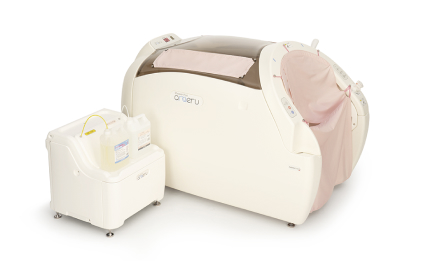
Equipment for taking a bath by showering
Shower Pod araeru
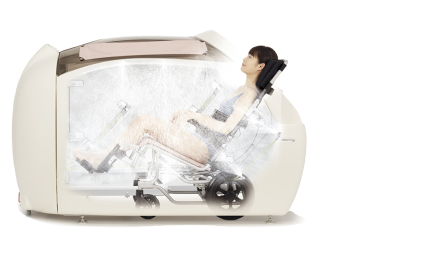
Image of showering the full body
KPI: Water Usage During Bathing
85 % reduction
in water usage for a 3-minute bath per individual
Good quality water resources are essential for a hygienic and healthy life. Even in Japan, where is generally recognized as having abundant water resources, the supply of water can become unstable due to disasters, irregular weather, and climate change. The Group contributes to creating a bathroom environment that also considers the conservation of rich water resources by providing facilities that allow comfortable bathing with a limited amount of hot water.
*Compared to the individual bath type of the Group.
*Actual water usage varies depending on bathing time and the user's physique
